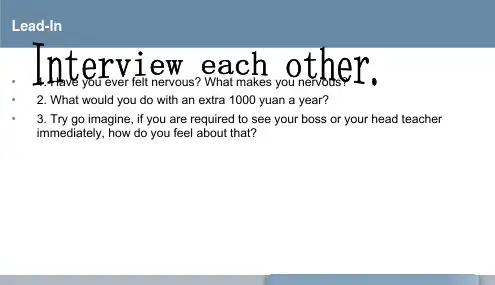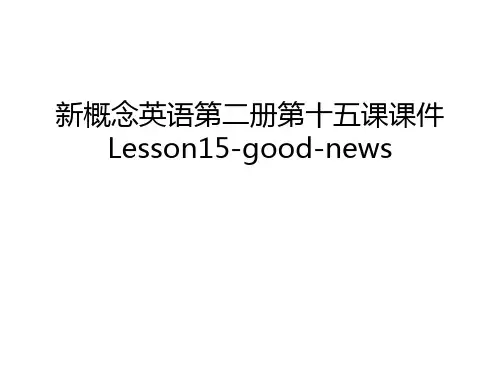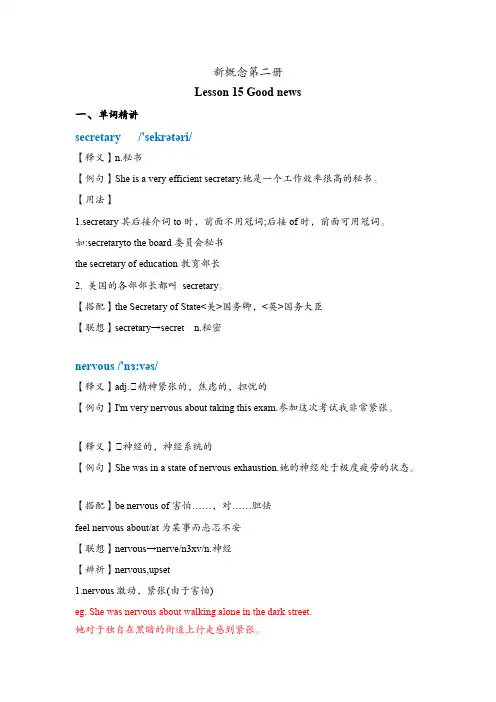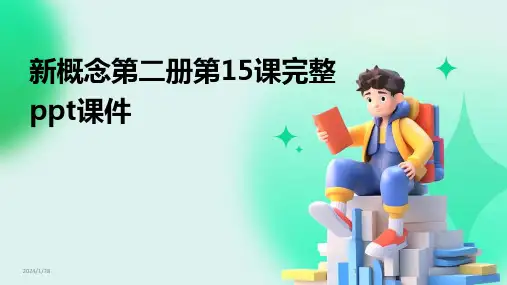新概念英语第二册第十五课课件Lesson15_good_news
新概念英语第二册第十五课课件Lesson15_good_news

He is nervous.
• nervous ['nə:vəs] adj. 精神紧张 的 神经
• nerve [nə:v] n. 神经 • 短语:
• be nervous about • 对…. 感到紧张
• Eg: Are you nervous about the English exam?
直接引语(变化前) 现在进行时
间接引语(变化后) 过去进行时
“I’m making coffee for you all,” she She said she was making coffee
said.
for us all.
Grammer - 2 直接引语转换间接引语
2.6 转换中的要点总结2-时态的转换3
Grammer - 2 直接引语转换间接引语
转换中的要点总结2-时态的转换1
直接引语(变化前) 一般现在时
间接引语(变化后) 一般过去时
“I know it,” he said.
He said that he knew it.
Grammer - 2 直接引语转换间接引语
2.6 转换中的要点总结2-时态的转换2
He said, “I have been doing it for hours.”
He said he had been doing it for hours.
Grammer - 2 直接引语转换间接引语
2.6 转换中的要点总结2-时态的转换7
直接引语(变化前) 过去完成时
间接引语(变化后) 过去完成时
Eg:He interrupted me while I was speaking. Eg:You interrupted my thoughts.
新概念英语第二册lesson15课件(精华版)

Revision: Lesson 14 Do you speak English?
★Key structure: • 过去完成时(9AUnit5):
时间状语从句中,如果两个动作都发生在过去,同时发生, 要用过去进行时态;如果一先一后发生,先发生的动作用 过去完成时,后发生的动作用一般过去时。 ★Special difficulties: • ask & ask for • except & except for & besides & apart from • either of & neither of & both of & all of
A.works B.had worked C.will work D.has worked
3.I like___of the books, that is, I don't like___of the designs.
A.either;neither B.neither;one C.neither;either D.either;both
I felt very nervous when I went into his office.
• The old woman felt nervous as she tried to cross the busy road. 这位老太太穿过拥挤的马路时感到很紧张。
• Don't be nervous! 别紧张!
L15 Good news
1
Revision:
Lesson 14 Do you speak English?
★Words and expressions:
☆amusing adj.好笑的,有趣的
新概念英语第二册Lesson15 good news课件 (共47张PPT)

☆amusing adj.好笑的,有趣的
☆experience n.经历,经验
☆wave
v.招手
☆lift
n.搭便车
☆reply
v.回答
☆language n.语言
☆journey n.旅行
• an amusing experience • 一次有趣的经历
• last year
• 去年
• in the south of
A.works B.had worked C.will work D.has worked
3.I like___of the books, that is, I don't like___of the designs.
A.either;neither B.neither;one C.neither;either D.either;both
物理的;身体的 罚款 海报;招贴 做广告;登广告 光荣;荣誉 讨价还价;讲条件;便宜货 没有希望的;绝望的 愚蠢的;傻的 疼痛;痛苦 陆续地;一个接一个地 应受(报答或惩罚);值得 敲击者;(足球的)前锋
Revision:
Lesson 14 Do you speak English?
★Words and expressions:
了 ,谢 谢 参 考 。 尊 敬 的 各 位 家长: 各 位 家 长 下 午好!很 高 兴能 和这么 多的家 长坐在 一起来 共同的 讨论孩 子们的学习情 况 。 在 做 的 各位家 长呢,有 的我们 是经常 见面,在 一起沟 通过很 多了,有 的呢 ,我们仅 仅 是 一 面 之 缘,今天 在这里 ,不管是 经常见 面还是 一面之 缘,我 指向开 门见山 的说点 , 不 想 说 那 些 冠冕堂 皇的话 ,不想浪 费大家 的时间 ,在这大 热天里 ,我相 信各位 家长也 不 是 为 了 来 听我的 一些虚 伪奉承 的话而 坐在这 里,都是 为了我 们的孩 子的学 习而来
新概念英语第二册第十五课课件Lesson15-good-news只是课件

3) 你买得起这个样品。不是很贵。
You can afford this model. It’s not very expensive.
b) ( = to be able to spend [time] ,give, do, etc, without serious loss or damage表示“抽出 时间,能够常和 can, be able to, could 连用
4) 她对乘飞机旅行感到紧张。
She was nervous about travelling by air.
Look up
a) (= to raise one’s head) 抬头
我抬起头来看时,见到有学生静静地看着我。
When I looked up, I saw five students watching me quietly. b) (= to search or consult) 查阅,查找
直接引语和间接引语
• 当我们要引用某人的话或想法时, 可以 将某人说的话一字不改的引用,这叫 “直接引语”.
• 为了简洁和紧凑,我们通常用“间接引 语”, 即对原话作适当的改变,把说话的 内容和想法传达给第三者.
• 在间接引语中,时态,语序,代词及其它 词应该作相应的变化.
1. 如果引语的引述动词是现在时,将来时或现在 完成时,我们一般要用说话者原话中所用的语态.
新概念英语第二册第十五课课件 Lesson15-good-news
Summary writing
• Mr. Harmsworth wanted to see me. I felt very nervous about this. I went into his office. He said business was bad. The firm could not pay such large salaries. Twenty people had left already. He did not ask me to leave as well. He offered me an extra £1,000 a year. (53 words)
新概念第二册Lesson 15 Lesson 15 Good news讲义

新概念第二册Lesson 15 Good news一、单词精讲secretary /'sekrətəri/【释义】n.秘书【例句】She is a very efficient secretary.她是一个工作效率很高的秘书。
【用法】1.secretary其后接介词to时,前面不用冠词;后接of时,前面可用冠词。
如:secretaryto the board委员会秘书the secretary of education教育部长2. 美国的各部部长都叫secretary。
【搭配】the Secretary of State<美>国务卿,<英>国务大臣【联想】secretary→secret n.秘密nervous /'nɜ:vəs/【释义】adj.①精神紧张的,焦虑的,担忧的【例句】I'm very nervous about taking this exam.参加这次考试我非常紧张。
【释义】①神经的,神经系统的【例句】She was in a state of nervous exhaustion.她的神经处于极度疲劳的状态。
【搭配】be nervous of害怕……,对……胆怯feel nervous about/at为某事而忐忑不安【联想】nervous→nerve/n3xv/n.神经【辨析】nervous,upset1.nervous激动,紧张(由于害怕)eg. She was nervous about walking alone in the dark street.她对于独自在黑暗的街道上行走感到紧张。
2.upset烦恼,心烦意乱(不愉快)eg.He was upset because he lost his wallet.他因为丢了钱包而心烦意乱。
afford /ə'fɔ:d/【释义】vt①负担得起,买得起,承担得起【例句】He cannot afford his wife's train fare. 他付不起妻子乘火车的费用。
新概念第二册第15课完整ppt课件

2024/1/28
15
关键语法结构剖析
01
现在完成时的用法及构成
现在完成时是表示过去发生的动作对现在造成的影响或结果,其构成是
“have/has + 过去分词”。
02
动词不定式的用法
动词不定式是一种非谓语动词形式,可以作主语、宾语、表语、定语、
状语等,其构成是“to + 动词原形”。
2024/1/28
重点
难点
理解课文中的文化内涵和背景知识; 提高学生的阅读、听力、口语和写作 能力。
掌握课文中出现的重点词汇和短语; 学习课文中出现的语法结构和表达方 式。
2024/1/28
5
学习方法与建议
预习
提前预习课文,了解课 文大意和背景知识。
2024/1/28
听讲
认真听讲,注意老师的 讲解和重点提示。
练习
复习
流利度。
2024/1/28
24
角色扮演活动设计
分配角色
根据主题分配角色,如导游、 游客、售货员、顾客等。
角色扮演
按照设计好的情节进行角色扮 演,注意语音语调和肢体语言 。
确定主题
选择与生活、工作相关的主题 ,如商务会议、旅游、购物等 。
2024/1/28
设计情节
为每个角色设计相应的情节和 对话,确保情节合理且有趣。
18
05 听力训练及技巧 指导
2024/1/28
19
听力材料选取原则
2024/1/28
真实性
01Leabharlann 选择真实场景下的对话或独白,如新闻、讲座、电影等,以提
高学生对实际语言运用的理解和反应能力。
多样性
02
涵盖不同领域和话题,包括日常生活、学术、商务等,帮助学
新概念英语第二册第15课-Good news
新概念英语第二册第15课:Good newsLesson 15 Good news佳音First listen and then answer the question.听录音,然后回答以下问题。
What was the good news?The secretary told me that Mr Harmsworth would see me. I felt very nervous when I went into his office.秘书告诉我说哈姆斯沃斯先生要见我。
我走进他的办公室,感到非常紧张。
我进去的时候He did not look up from his desk when I entered. After I had sat down, he said that business was very bad.他连头也没抬。
待我坐下后,他说生意非常不景气He told me that the firm could not afford to pay such large salaries. Twenty people had already left.他还告诉我,公司支付不起这么庞大的工资开支,有20个人已经离去I knew that my turn had come.我知道这次该轮到我了'Mr Harmsworth' I said in a weak voice.“哈姆斯沃斯先生”我无力地说'Don't interrupt' he Said.“不要打断我的话”他说Then he smiled and told me I would receive an extra &1000 a year!然后他微笑了一下告诉我说,我每年将得到1,000 英镑的额外收入!New words and expressions 生词和短语secretaryn. 秘书nervousadj. 精神紧张的affordv. 负担得起weakadj. 弱的interruptv. 插话,打断Notes on the text课文注释1 look up,抬头看。
新概念英语第二册第十五课PPT课件Lesson 15 Good news
Lesson 15 Good news
Grammar
二、直接引语转换成间接引语的规则 1.人称代词的变化 人称代词的变动要根据语境及转述人的不同作相应变化,一般情况下,与汉语中
的变化相同。可记住一个口诀:“一主、二宾、三不变”。即第一人称按照主句 中的主语变化,第二人称按照主句中的宾语变化,第三人称一般不要变化。如:
He said,
“I am glad to see you.”
He said that
he was glad to see me.
“Do you know the man over there?” Mary said to Tom.
Mary asked Tom if he knew the man over there.
Lesson 15 Good news
Read the passage and answer the following questions. 1. Who wanted to see you?
Mr. Harmsworth wanted to see me. 2. How did you feel about this?
‘Don’t interrupt,’ he said.
Then he smiled and told me that I would receive an extra thousand pounds
a year!
PLAY
Lesson 15 Good news
Grammar 直接引语 VS 间接引语 引用或转述别人说的话时,采用两种形式:一是一字不改地将别人的话加以引用, 这叫直接引语;二是用自己的话加以转述,这叫间接引语。一般来讲,直接引语 须放在引号内,间接引语不必用引号,而且多用宾语从句的形式表达。例如:
新概念2第15课PPT课件
interrupt sb 打断某人的话 1.打断(讲话或讲话人) 打断别人谈话是不礼貌的。
It is impolite to interrupt others. 2.中断;遮断;阻碍 交通被暴雪中断了。 The traffic was interrupted by snowstorm.
23
近义词:disturb vt. 打扰,扰乱
19
ห้องสมุดไป่ตู้
Strong(强的)(good/loud/great)
He has a strong/healthy body
20
Great mind
Hawking has a great/strong mind but a weak body.
21
interrupt
打断(别人的话等); 暂停;中断
n. interruption
weak(弱的)
( sick/low/dull )
Weak health
身体
声音 Weak/low voice
视力
Eg. You are weak and not fit to command an
army
智力 a weak mind(低能)
学习能力 he is weak in mathematics.
/afford someone great pleasure 给某人很大乐趣
16
afford sb. a help (offer)
The boy was affording a help to the girl.
17
weak 虚弱的;无力的
每上完一周(week)课,我都觉得浑身无力(weak)
18
14
新概念英语第二册Lesson 15 (共44张PPT)
•afford to do •今年我们没钱出去吃饭。 •We _______________ eat out .
can't afford to
/100
New words and expressions
பைடு நூலகம்weak adj.
•not physically strong: •弱的
/100
Grammar paid the bill
Grammar washed the car
Grammar burnt the shirt
Grammar stained the carpet
Grammar
4
• T:There's been an accident. • S1:What did he say? I didn't hear. • S2:He said there'd been an accident.
Grammar
时态的变化 过去时(said),从句谓语 时态变化。 现在时(says),无需变化。
Grammar 时态变化
将来时 现在时 过去时
• 过去将来时 • 过去时 • 过去完成时
Grammar 连词选用看三角
that if/whether what/who/which/whom where/when/why/how
/100
GRAMMAR
Grammar 间接引语
Bill Gates said, “I will donate all my money to my wife’s foundation.”
Bill Gates said I will donate…
Grammar 关键点
- 1、下载文档前请自行甄别文档内容的完整性,平台不提供额外的编辑、内容补充、找答案等附加服务。
- 2、"仅部分预览"的文档,不可在线预览部分如存在完整性等问题,可反馈申请退款(可完整预览的文档不适用该条件!)。
- 3、如文档侵犯您的权益,请联系客服反馈,我们会尽快为您处理(人工客服工作时间:9:00-18:30)。
d) 现在完成时改为过去完成时: “I have just heard the news,” he said. = he said that he had just heard the news. e) 一般过去时改为过去完成时: “I broke the window,” Tom said. = Tom said that he had broken the window.
You should look the word up in the dictionary.
Extra [adj]额外的 The football match went into extra time . [n]另外 ,电影临时演员 Another and extra 区别
The secretary told me that Mr. Harmsworth would see me. I felt very nervous when I went into his office. He did not look up from his desk when I entered. After I had sat down, he said business was very bad. He told me that the firm could not afford to pay such large salaries.Twenty people had already left. I knew that my turn had come. “Mr. Harmsworth,” I said in a weak voice. “Don’t interrupt,” he said. Then he smiled and told me I would receive extra thousand pounds a year!
★weak adj. 弱的 in a weak voice ★interrupt v. 插话,打断 (n.)interruption It is impolite to interrupt others . 使中断 we interrupted the programme to bring you a newr make a break) 打断,停止 1)他打断了我的话。 He interrupted me while I was speaking. 2) 他们停止了工作,以便吃午饭。 He interrupted his work to eat his lunch. 3) 你打断了我的思路。 You interrupted my thoughts.
2. 如果引述动词是过去时, 引语应该作相 应的变化. a) 一般现在时改为一般过去时: “I never work on Sundays,” she said. = She said that she never worked on Sundays. b) 现在进行时改为过去进行时: “It isn’t raining,” she told me. = She told me that it wasn’t raining. c) 一般将来时改为过去将来时: “ I’ll tell you a very funny story,” she said. = She told me that she would tell me a very funny story.
直接引语和间接引语
当我们要引用某人的话或想法时, 可以将某 人说的话一字不改的引用,这叫“直接引 语”. 为了简洁和紧凑,我们通常用“间接引语”, 即对原话作适当的改变,把说话的内容和想 法传达给第三者. 在间接引语中,时态,语序,代词及其它词应 该作相应的变化.
1. 如果引语的引述动词是现在时,将来时或现在完成时, 我们一般要用说话者原话中所用的语态.
Lesson 15 Good News
★secretary n. 秘书 Secret [n] Tell /keep a secret [adj]a secret marriage A secretary of state Secretive He is rather secrective about his personal problems.
“Will I be in time?” she wants to know. = She wants to know if she will be in time. I’ve already said, “I don’t know want to go.” = I’ve already told you that I don’t want to go. 句中wants 和said 是引述词.
She was nervous about travelling by air.
★afford v. 负担得起 afford sth. I can afford the hoilday.有时间去 afford money/time afford to do sth. I can afford five yuan./I can afford the book. /I can afford to buy the book.
★nervous adj. 精神紧张的 神经nerve be nervous about /of worried:为以后的事情担心 upset:不安的 Irritable 易怒的 Nervous breakdown 神经紧张 【口】
nervous
(= restless or uneasy) 紧张的;害怕的
1) 考试使我感到紧张。
Examinations make me nervous.
2) 他害怕陌生人。
He’s nervous of strangers.
3) 别紧张——大夫不会弄痛你的。
Don’t be nervous --- the doctor won’t hurt you.
4) 她对乘飞机旅行感到紧张。
Look up
a) (= to raise one’s head) 抬头
我抬起头来看时,见到有学生静静地看着我。
When I looked up, I saw five students watching me quietly. b) (= to search or consult) 查阅,查找
你应该在字典上查一下这个单词。
直接引语改为间接引语时, 人称代词和物 主形容词应该作适当的变化。地点和时间 状语也应作相应改变。 直接引语------间接引语 now ----- then this ---- that these---- those here ---- there ago ----- before my ----- his/her tomorrow ---- the following day ---- the next day
b) ( = to be able to spend [time] ,give, do, etc, without serious loss or damage表示“抽出 时间,能够常和 can, be able to, could 连用 1) 我抽不出三周休假时间。 I can’t afford three weeks away from work. 2) 我最近没有去看过电影。我抽不出时间。 I haven’t been to the cinema recently/lately. I can’t afford the time.
